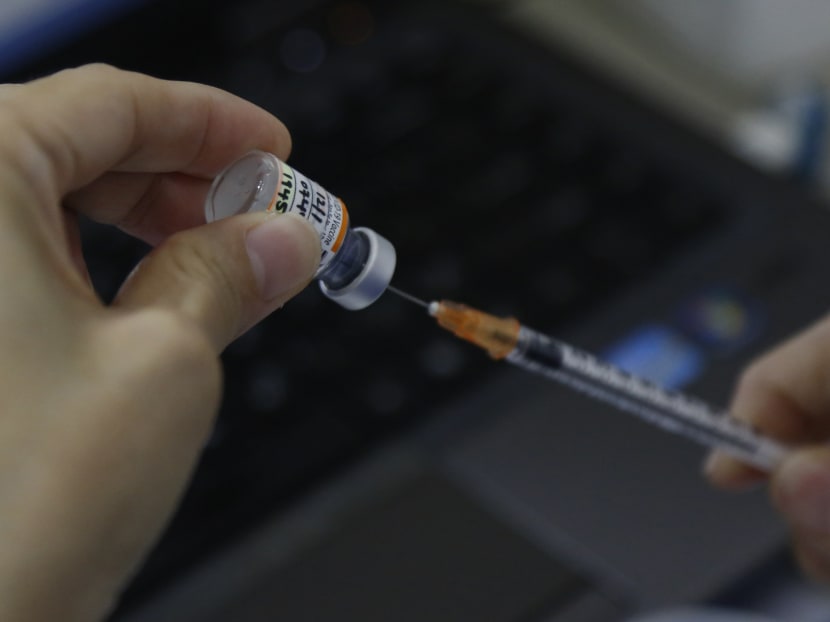Moderna booster gives more protection against Covid-19 to those over 60 who took Pfizer as primary vaccine: NCID study
SINGAPORE — Interim findings from the first Singapore study on vaccine mixing found that older adults who had two primary doses of the Pfizer-BioNTech or Comirnaty vaccine received more protection against Covid-19 with a Moderna vaccine booster than with a third dose of Pfizer.

- People aged 60 and above had twice the number of antibodies after seven days of receiving a Moderna vaccine booster
- However, they also experienced fever and body weakness more frequently after receiving the jab
- This is the finding of a study by the National Centre for Infectious Diseases that compared immune responses from different Covid-19 vaccine combinations
- It found that antibody levels in all participants increased 50-fold within one week after the booster shot on average
SINGAPORE — Interim findings from the first Singapore study on vaccine mixing found that older adults who had two primary doses of the Pfizer-BioNTech or Comirnaty vaccine received more protection against Covid-19 with a Moderna vaccine booster than with a third dose of Pfizer.
They recorded twice the number of antibodies against all coronavirus variants of concern, such as Omicron, after seven days of getting a third injection with the Moderna vaccine.
However, they also experienced fever and body weakness more frequently after receiving the Moderna jab, though no participant had any serious side effects.
This is the first study by the National Centre for Infectious Diseases (NCID) that compared immune responses evoked by different vaccine combinations and how this response changes over time.
The study, done between mid-October and early December last year, involved 100 participants — two of whom later withdrew — who had received two doses of the Pfizer-BioNTech or Comirnaty vaccine.
Half of the participants were under the age of 60 while the other half were aged 60 and above. Participants were randomly assigned to receive either the Moderna vaccine or the Pfizer-BioNTech or Comirnaty vaccine as a booster shot. Both brands of vaccines use the messenger ribonucleic acid (mRNA) technology.
Interim findings published on Thursday (March 17), which have yet to be peer-reviewed, showed that antibody levels in participants before getting their booster shots varied, and the levels tend to be lower among men and decreased with age.
The researchers also noted that before receiving the booster, most adults had low levels of antibodies — below 30 per cent — to neutralise the Omicron virus strain regardless of age.
ANTIBODY LEVELS INCREASED 50-FOLD WITHIN A WEEK
The study found that the antibody response after participants received their booster shots were “uniformly excellent”.
On average, antibody levels in all participants increased 50-fold within one week after the shot.
Researchers found that participants aged 60 and above recorded 1.5 times higher antibody levels after 28 days of getting boosted with the Moderna vaccine, compared to those that got the Pfizer-BioNTech or Comirnaty booster.
Against the Omicron variant, the Moderna booster provided 84.3 per cent protection after 28 days. The Pfizer-BioNTech or Comirnaty booster provided 72.8 per cent of protection.
The study found that antibody levels in participants under 60 were similar between the two vaccines.
“These observations complement studies from other international trials and provide reassuring local data that a third dose of mRNA vaccine is safe and effective at boosting the immune response,” the researchers from NCID said.
Dr Barnaby Young, who is leading the trial, said the interim results showed that although the Omicron variant can escape immunity among fully vaccinated persons, taking either vaccine as a booster helps increase protection against Omicron by more than 50 per cent by the seventh day of getting boosted.
Dr Young, who is head of the Singapore Infectious Disease Clinical Research Network at NCID, added: “Individuals at higher risk of severe Covid-19 such as older adults aged 60 and above are more likely to have low antibody levels six months after the primary vaccination series, so it is important that this group receives a booster shot.”
The emergence of variants that can evade protective immunity remains a concern, Dr Young said, highlighting the need for a long-term Covid-19 immunisation strategy.
The study will continue to collect blood samples from participants after six months and a year of getting boosted to monitor the waning of antibody levels.
The researchers recently embarked on the next phase of the study in January. This stage involves up to 200 participants who had received two primary doses of the Pfizer-BioNTech or Comirnaty vaccine or Moderna vaccine.
The participants will be given either mRNA vaccines or Covaxin, which has been approved by the World Health Organization but has yet to be approved in Singapore as a Covid-19 vaccine booster.
Researchers said that they planned to extend this study to other vaccines in the future, including Nuvaxovid by Novavax, which was given the go-ahead for use last month by the Singapore authorities.








